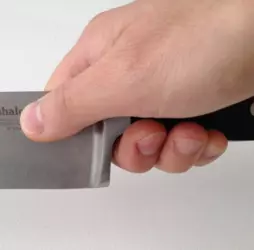When it comes to kitchen knives for cooking, the only knives you need are a paring knife, serrated knife, and a chefs knife. That will get you 99% of what you're going to make day to day. Yes, if you're doing a lot of fish, get a fillet knife. Yes, if you're butchering meat, get a cleaver. But for most people, you only need those three knifes.
For your everyday work horse, stick to either Dexter-Russell or Victorinox. They're cheaper than Japanese knives and they're much easier to keep sharp. For your fancy triple digit price tag knives, you're going to want to use a whetstone and hand sharpen it or pay a professional to do it. For the Victorinox and Dexter-Russell, you can just hit it with a honing rod to knock the edge back in alignment (and if that doesn't work, a Sharpal is enough to get it back to working order).
I'm sure a lot of you are just realising this for the first time, but yeah, the
point of that rod in your kitchen block is not to sharpen your knife but to straighten out the edge.
Speaking of kitchen blocks, don't stick your knives in a kitchen block. Aside from being a
massive waste of space that have way more knives than you need, constantly taking them out and putting them in just wears out the edge faster. Just get a standing magnetic knife holder.
Now, are the Japanese knives nice looking and good quality. Sure. But so is the 1960 Cadillac Series 62 Coupe and you
know that thing wouldn't be my daily driver.
Oh, and for holding the knife, you wanna use a "pinch grip" where the middle, ring, and pinkie finger are gripping the handle and your thumb and pointer are pinching the heel of the blade. Don't grip the handle like your dick or hold it like you're Ghostface. Pinch grip. Gives you the maximum control since it makes the knife is less likely to slip, slide, and roll around if you just gripped it by the handle (handshake grip).

Don't use glass/stone/metal cutting boards, wash and dry by hand after you're done and strop it every now and then and you'll be fine.
I'm also going to add plastics to the list of cutting boards you shouldn't use. Cutting on a plastic board means you're cutting into a plastic board and all those plastics are likely going to end up into your food. They're also much worse in terms of sanitation as all those nicks are the perfect place to bacteria to linger. The idea that wood is less sanitary comes from studies that omit basic things like
washing the fucking cutting board. So, yeah, I would go with a wood cutting board and, honestly, use whatever oil you have in abundance. If you're using and cleaning it regularly, whatever oil you use likely won't have enough time to go rancid. If you are concerned, though, than I suggest using a drying oil like linseed or tung oil.























